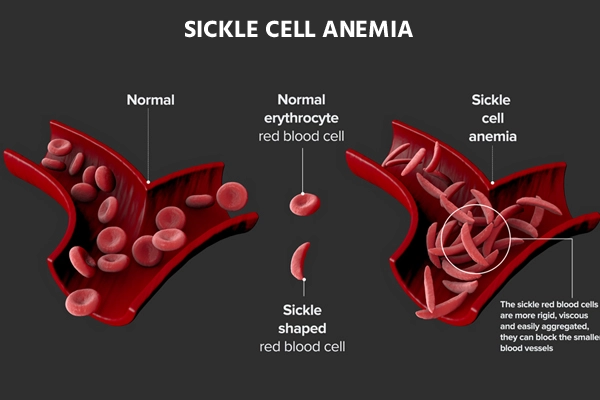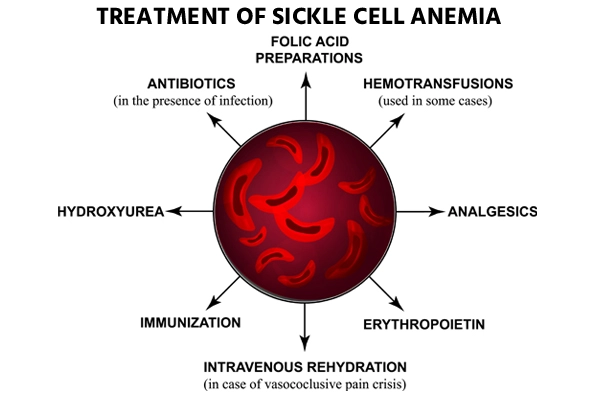What is Sickle Cell Anemia?
Sickle cell anemia is one of the sickle cell diseases that are hereditary illnesses. It has an impact on the structure of red blood cells, which transport oxygen throughout the body.
Red blood cells are typically spherical and flexible, allowing them to pass through blood vessels with ease. Some red blood cells in sickle cell anemia are shaped like sickles or crescent moons. It becomes hard and sticky, slowing or blocking blood flow. Treatments can help reduce pain and avoid disease-related consequences.
Sickle Cell Anemia symptoms
Symptoms of sickle cell anemia commonly begin around the age of six months. They differ from one individual to the next, and they may alter over time. The following are examples of signs and symptoms:
- Anemia - Sickle cells easily disintegrate and die. Red blood cells last approximately 120 days before needing to be replaced. However, sickle cells die in 10 to 20 days, leaving a red blood cell shortage (anemia). The body can't obtain enough oxygen if it doesn't have enough red blood cells, which produces weariness.
- Painful episodes - Pain or episodes of extreme pain, are common symptoms of sickle cell anemia. Pain occurs when sickle-shaped red blood cells impede blood flow to your chest, abdomen, and joints through tiny blood channels.
The discomfort can range in intensity and linger anywhere from a few hours to several days. Some folks only have a couple of pain crises every year.
Chronic pain affects certain adolescents and adults with sickle cell anemia, which can be caused by bone and joint degeneration, ulcers, and other factors.
Hands and feet swelling
Sickle-shaped red blood cells impede blood circulation in the hands and feet, causing edema.
Infections occur frequently
Sickle cells can harm the spleen, making it more susceptible to infection. Vaccinations and antibiotics are regularly given to infants and children with sickle cell anemia to prevent potentially life-threatening illnesses like pneumonia.
Late puberty or growth
Red blood cells deliver oxygen and nutrients to the body, allowing it to grow. In newborns and children, a lack of healthy red blood cells can limit growth and cause puberty to be delayed.
Issues with vision
Sickle cells can clog the tiny blood arteries that supply the eyes. This can cause vision issues by damaging the retina, which is the part of the eye that interprets visual images.
Get a second opinion from trusted experts and makeconfident, informed decisions.
Get Second Opinion
When to see a doctor?
If you or your kid shows symptoms of sickle cell anemia, see your doctor very soon. Children with sickle cell anemia are more susceptible to infections, which commonly begin with a fever and can be life-threatening. A fever of more than 101.5 F should be treated as soon as possible. See a doctor for below aftermaths of sickle cell anemia.
- If you have signs of a stroke, seek medical help.
- Paralysis or weakness on one side of the face, arms, or legs
- Confusion
- Walking or talking with difficulty
- Vision shifts unexpectedly
- Numbness
- Headache
Causes and Risk Factors
Sickle cell anemia is caused by a mutation in the gene that instructs the body to produce hemoglobin, an iron-rich molecule found in red blood cells. Red blood cells use hemoglobin to transport oxygen from the lungs to the rest of the body. Red blood cells become hard, sticky, and distorted as a result of the hemoglobin linked with sickle cell anemia.
Both the mother and father must have one copy of the sickle cell gene — also known as sickle cell trait and convey both copies of the altered form to the child for the child to be afflicted.
If only one parent carries the sickle cell gene to their child, the youngster will inherit the characteristic. People with the sickle cell trait have one normal hemoglobin gene and one mutated variant of the gene, which allows them to produce both normal and sickle cell hemoglobin.
They may have sickle cells in their blood, but they are usually asymptomatic. They are, nonetheless, disease carriers, meaning they can pass the gene on to their children.
Complications of Sickle cell anemia
Following are the complications
- Stroke
- Acute chest syndrome
- Pulmonary hypertension
- Organ damage
- Blindness
- Leg ulcers
- Gallstones
- Priapism
- Deep vein thrombosis
- Pregnancy complications
Sickle cell anemia Prevention & Diagnosis
Seeing a genetic counselor before trying to conceive might help you understand your risk of having a child with sickle cell anemia if you carry the sickle cell trait. A genetic counselor can also discuss treatment options, preventative measures, and reproductive alternatives with you.
For diagnosing this disease one might take the following tests -
- A blood test can detect the hemoglobin type that causes sickle cell anemia. However, older children and adults can also be evaluated.
- A blood sample is taken from an arm vein in adults. The blood sample is frequently taken from a finger or heel in young children and babies. After that, the sample is sent to a laboratory to be checked for sickle cell hemoglobin.
- If you or your kid has sickle cell anemia, your doctor may recommend further tests to monitor for illness complications.
- You or your child will almost certainly be directed to a genetic counsellor if you or your child has the sickle cell gene.
- Stroke risk assessment - A unique ultrasound equipment can determine which children are at a higher risk of having a stroke. Children as young as two years old can undergo this painless test, which employs sound waves to assess blood flow in the brain. Blood transfusions on a regular basis can help to reduce the risk of stroke.
- Prenatal tests to detect sickle cell genes
- An unborn infant can be diagnosed with sickle cell disease by taking a sample of the fluid around the baby in the mother's womb (amniotic fluid). Ask your doctor about this screening if you or your partner has sickle cell anemia or the sickle cell trait.
Sickle cell anemia Treatment
Treatment for sickle cell anemia mainly focuses on minimizing pain episodes, alleviating symptoms, and avoiding consequences. Medications and blood transfusions may be used as treatments. A stem cell transplant may be able to treat the condition in certain children and teenagers.
Medications:
Doctor will prescribe some medicines for management of this conditions such as Hydroxyurea (Droxia, Hydrea, Siklos), L-glutamine oral powder (Endari), Crizanlizumab (Adakveo), Voxelotor (Oxbryta), Pain-relieving medications.
Surgical and other interventions
If medications don't provide any relief then surgical methods are advised such as -
Blood Transfusions
These are used to treat and prevent problems in persons with sickle cell disease, such as stroke. Red blood cells are taken from a supply of donated blood and supplied through a vein to a person with sickle cell anemia in a red blood cell transfusion. This helps lessen symptoms and consequences by increasing the quantity of normal red blood cells. An immunological reaction to the donor blood, which can make it difficult to find future donors; infection; and an overabundance of iron in your body are all risks. If you get blood transfusions on a frequent basis, you may need treatment to lower your iron levels, which can harm your heart, liver, and other organs.
Transplantation of stem cells
This surgery, also known as a bone marrow transplant, involves replacing sickle cell anemia-affected bone marrow with healthy bone marrow from a donor. A matched donor, such as a sibling, who does not have sickle cell anemia is frequently used in the surgery. Because of the risks of a bone marrow transplant, which include mortality, it is only suggested for persons with severe symptoms and consequences of sickle cell anemia, mainly children. The only known cure for sickle cell anemia is a stem cell transplant.
Adult stem cell transplantation and gene treatments are now undergoing clinical testing.
Lifestyle Changes and Self Care
Following are the lifestyle changes one should make in order to manage this disease
- Daily folic acid supplements and a healthy diet should be taken to generate new red blood cells, bone marrow need folic acid and other vitamins.
- Consult your doctor before taking folic acid and other vitamins. Consume a wide range of brightly coloured fruits and vegetables, as well as whole grains.
- Drink plenty of water. A sickle cell crisis might be exacerbated by dehydration. Drink plenty of water throughout the day, aiming for eight glasses each day.
- Avoid exposure to extreme heat or cold, it can increase your risk of a sickle cell crisis.
- Exercise regularly, talk with your doctor about how much exercise is right for you.
- Use nonprescription medications with caution. Use pain medications, such as ibuprofen (Advil, Motrin IB, Children's Motrin, others) or naproxen sodium (Aleve) because of the harmful effect on your kidneys. Ask your doctor before taking nonprescription drugs.
- Don't smoke it increases your risk of pain crises.
Do's and Don’ts
A person with Sickle cell anemia has to follow sets of do’s and don’ts to manage it and the related symptoms. Following are some do’s and don’ts -
| Do’s |
Don’ts |
| Drink plenty of water. |
Smoke |
| Eat a healthy diet |
Use non-prescription medicines. |
| Consume fruits that are good for hemoglobin. |
Go out in extreme heat or cold temperature. |
| Exercise regularly. |
Wait for your symptoms to get worse. |
| Take folic acid supplements |
Forget to take regular checkups and doctor appointments. |
Sickle cell anemia can be a lifetime threat, however it can be managed. It is better to follow some precautions and tips to decrease the complications. Follow the above tips to prevent the aggravation of symptoms of Sickle cell anemia.
Sickle cell anemia Care at Medicover Hospitals
At Medicover Hospitals, we have the most trusted team of doctors and medical experts who are experienced in providing excellent healthcare services to the patients with compassion and care. Our diagnostic department is equipped with modern technology and equipment to conduct the tests required for the diagnosis of Sickle cell anemia based on which a dedicated treatment plan is designed. We have an excellent team of hematologists and pediatric hematologists who diagnose and treat this condition with utmost precision that brings successful treatment outcomes.


